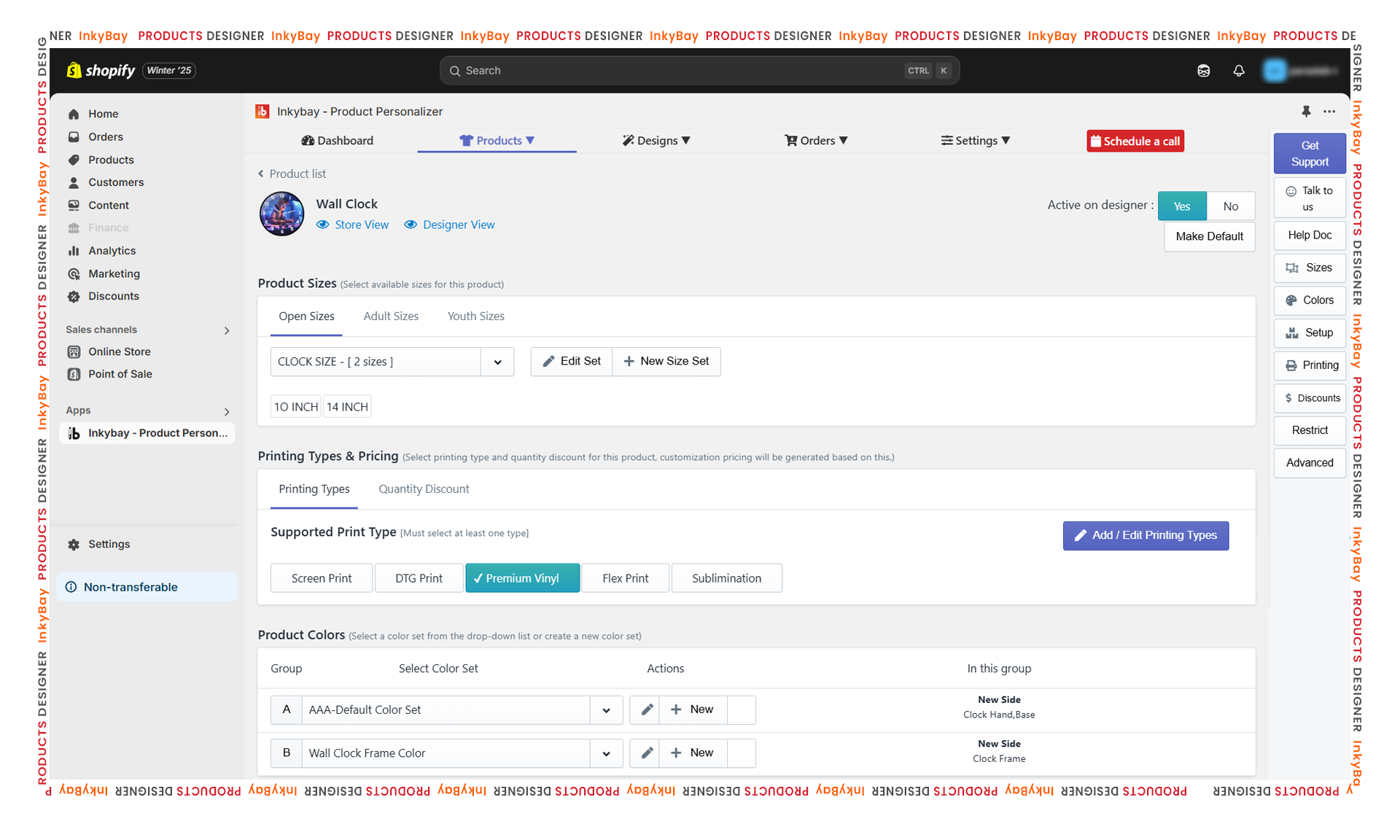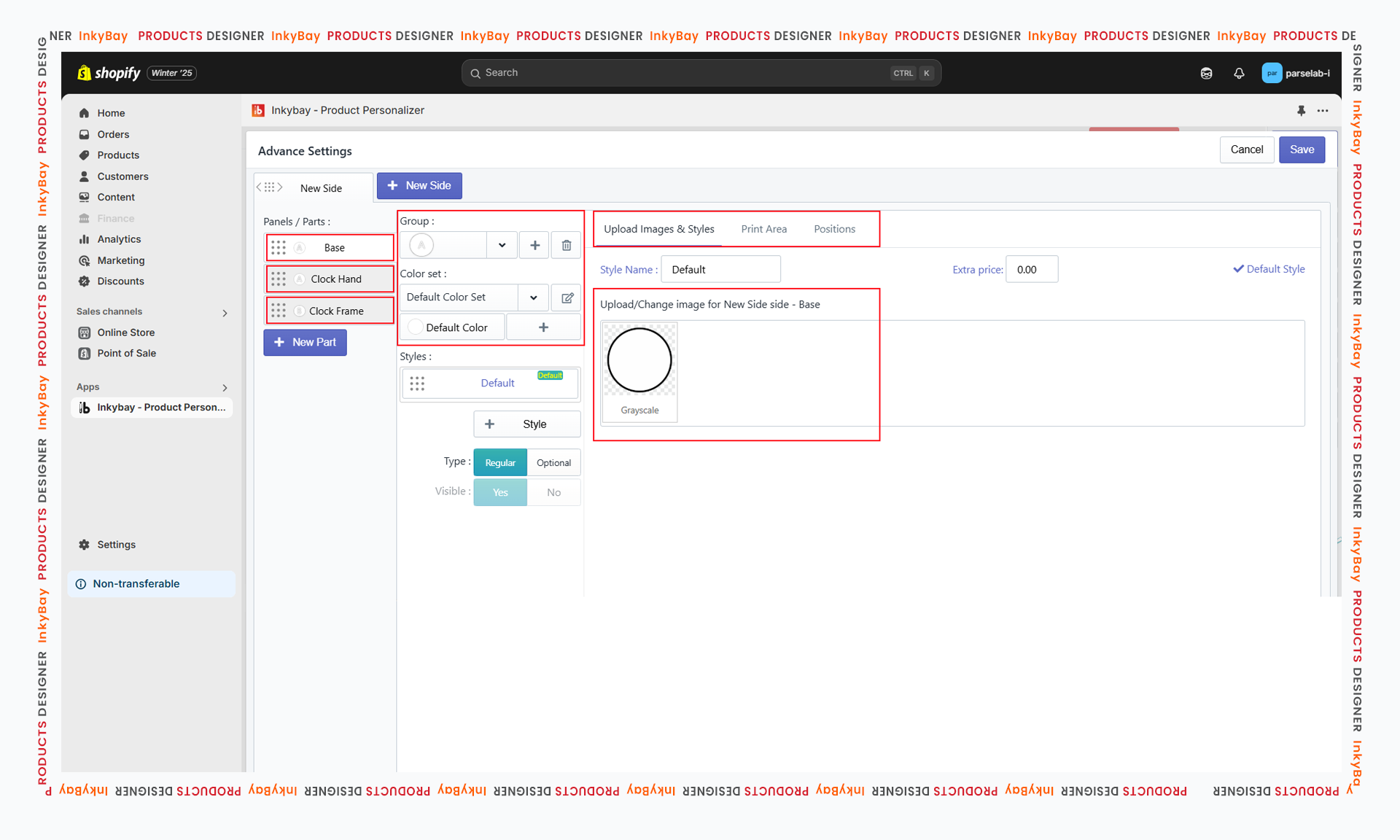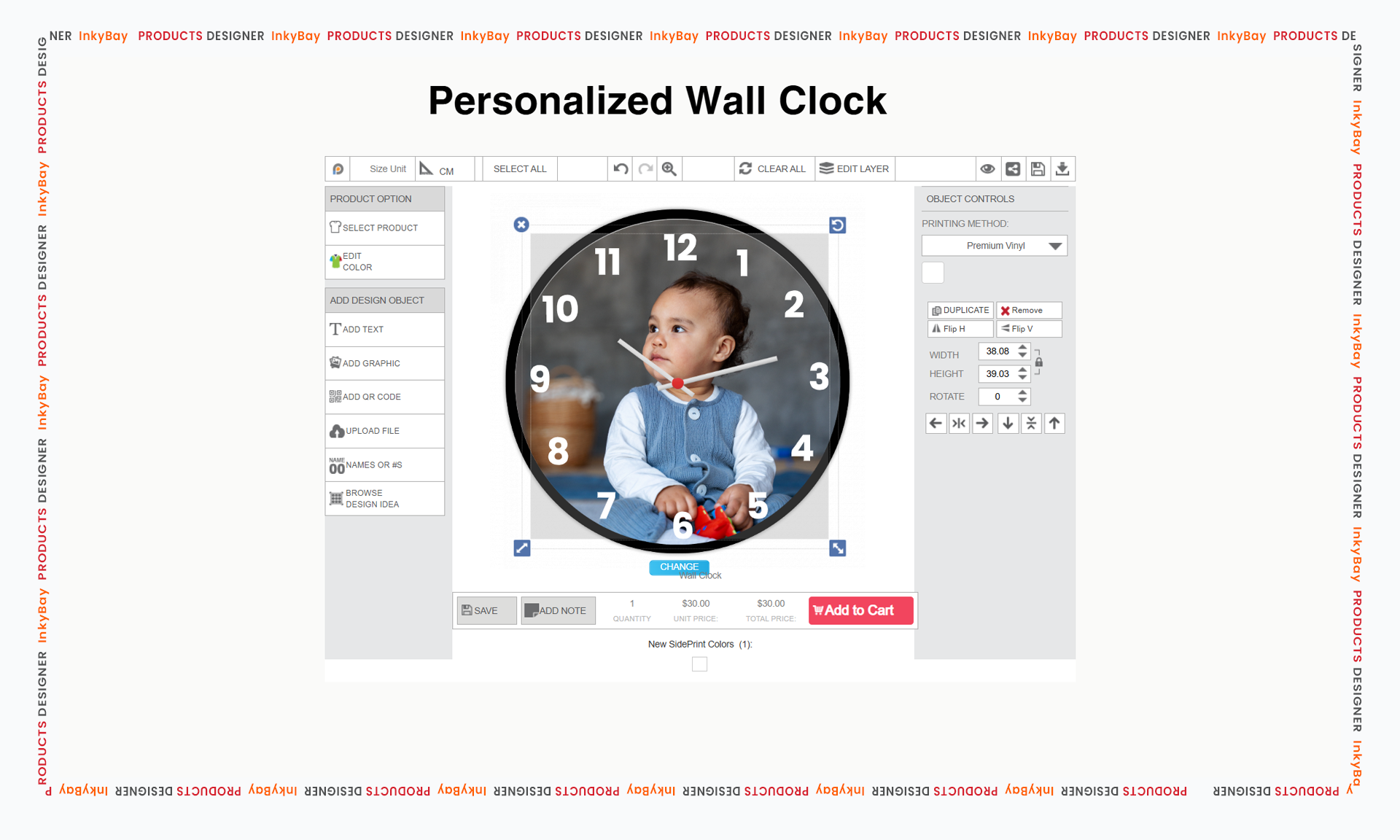Are you one of those who randomly searches for a business idea on Google and ends up disappointed with search results featuring businesses that are already saturated and highly competitive? If so, I believe you’ll appreciate my idea of setting up a personalized wall clock business. Still not convinced? Let’s explore the reasons why and how to set up a personalized wall clock business.
Table of Contents
Why choose setting up a personalized wallclock business?
I can give you numbers after numbers why you should set up a personalized wall clock business but let’s make it more logical and convincing with points to consider.
1. High Return on Investment:
A personalized wall clock wouldn’t require a high investment, but it would definitely return a high volume. How? Let’s say you buy those wall clocks from Alibaba or other sources at a rate of $1 to $2 and spend around $5 on customization features and another $2 per unit for marketing purposes.
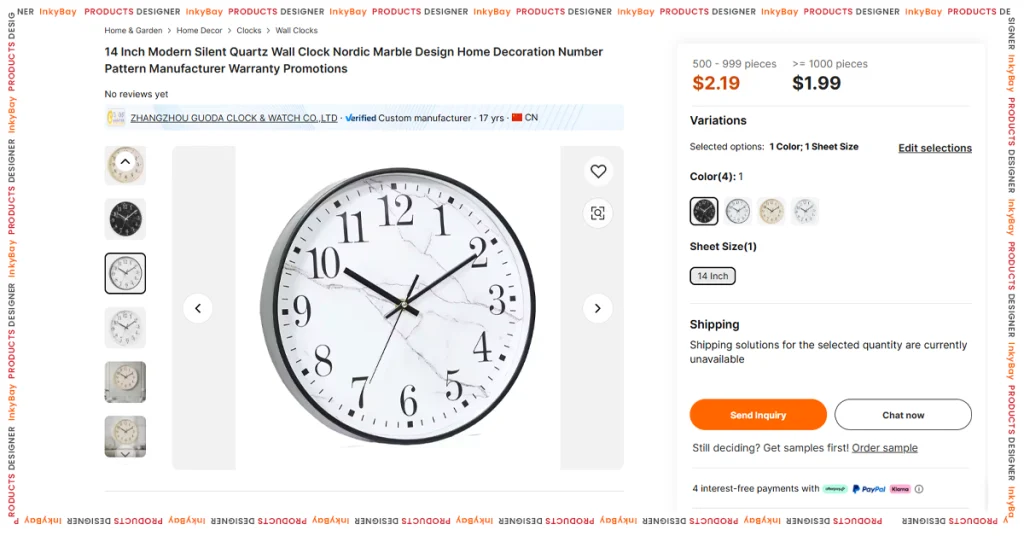
If we take the maximums into account, we’ll be spending around $9 to $10 per unit of the wall clock. Now, the average selling price of such customized products is $30. So you’re getting a 200% to 300% return on your investment. This is probably the foremost reason you should start a personalized wall clock business.
2. Personalization Builds Emotional Connection:
Personalized wall clocks often hold sentimental value, as they can commemorate special occasions, family moments, or personal milestones. This emotional connection increases their appeal and can lead to higher customer loyalty and repeat purchases.
3. High Demand for Customization:
Having a wall clock is nothing fancy but what makes it special is the touch of personalization. People nowadays seek for things which are only tailored for themselves. Offering customizable wall clocks allows you to tap into this trend, providing products that reflect individual tastes and preferences, making them highly desirable.
4. Scalability:
Scalability is a crucial aspect for any business, especially one that starts with a small investment. For example, as we previously discussed, you start by sourcing wall clocks from Alibaba at a cost of $1 to $2 per unit and spend an additional $5 on customization and $2 on marketing per clock. Initially, you invest in producing about 55 clocks for a total investment of around $500. As demand grows, you gradually scale your Personalized Wall Clock Business by investing in advanced customization equipment, hiring additional staff if necessary, and enhancing your marketing strategies.
By efficiently streamlining your production processes and optimizing your supply chain, you can reduce costs and handle larger volumes. As your customer increases, your revenue does so, allowing you to produce and sell 500 clocks per month with a reduced cost per unit.
This scalability ensures that your Personalized Wall Clock Business can grow sustainably without a large initial investment, ultimately leading to increased reach, sales, and profit margins. This approach of starting small and scaling gradually is key to achieving long-term success while managing costs effectively.
5. Eco-Friendly Options:
With the increasing awareness of environmental issues, there is a growing demand for eco-friendly products across various industries. By offering a custom wall clock made from sustainable materials, you can tap into this trend and attract environmentally conscious customers, thereby differentiating your business in a crowded market.
Using materials such as reclaimed wood, bamboo, and recycled glass not only reduces environmental impact but also adds a unique and natural appeal to your products. For example, wall clocks made from reclaimed barn wood not only look aesthetically pleasing but also tell a story about their origins. Bamboo, known for its fast growth and minimal environmental impact, can be used to create stylish and sustainable timepieces.
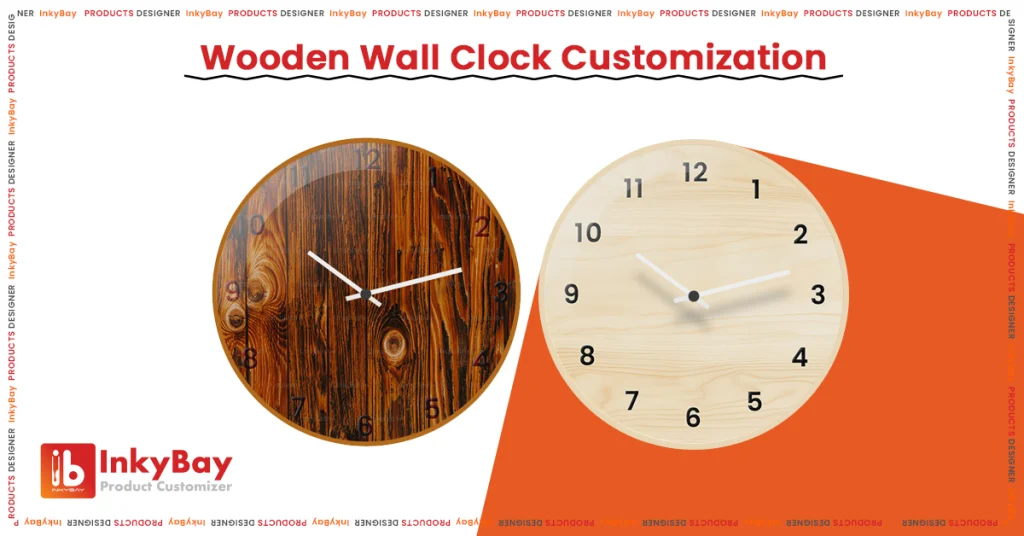
In addition to using eco-friendly materials, it’s essential to choose environmentally friendly finishes and paints. Natural oils and waxes can be used to protect the wood, while water-based paints and varnishes reduce the environmental impact compared to traditional solvent-based products. Offering a range of natural finishes can also add to the aesthetic appeal of your clocks, showcasing the beauty of the raw materials. By focusing on sustainability, your Personalized Wall Clock Business can attract a niche market of environmentally conscious customers who are willing to pay a premium for products that align with their values.
Shopify vs WordPress: A Detailed Comparison for a Personalized Wall Clock Business
When comparing Shopify vs WordPress for a personalized wall clock business, several key factors come into play:
1. Ease of Setup and Management
Shopify: What really put Shopify ahead is that it was designed specifically for e-commerce, making it incredibly easy to set up and manage an online store. It offers a user-friendly interface with drag-and-drop functionality, allowing you to create and customize your store without needing extensive technical knowledge. Shopify also provides built-in tools for inventory management, order processing, and customer support, streamlining the entire process.
WordPress: WordPress, while highly flexible, requires more technical expertise to set up and manage an e-commerce store. You’ll need to install plugins like WooCommerce to handle e-commerce functionalities, and you may need to customize themes or code to achieve the desired look and functionality. This can be time-consuming and may require hiring a developer if you’re not tech-savvy.
2. Integration with Customization Apps
Shopify: Shopify offers seamless integration with various customization apps, such as InkyBay, which allows customers to personalize their wall clocks with designs, texts, and images. These apps are easy to install and use, providing a smooth experience for both you and your customers.
WordPress: WordPress also supports customization apps, but the process can be more complex. You’ll need to find and install the right plugins, and there may be compatibility issues between different plugins. Additionally, managing and updating these plugins can be more challenging compared to Shopify’s integrated app store.
3. Scalability and Security
Shopify: Shopify is highly scalable, allowing you to upgrade your plan and resources as your business grows. It handles increased traffic and transactions smoothly, ensuring that your store remains operational even during high-demand periods. Shopify also provides robust security features, including SSL certification, PCI compliance, and regular updates to protect your store from cyber threats.
WordPress: While WordPress can be scaled too, it requires more effort and technical knowledge to optimize for increased traffic and transactions. You’ll need to ensure that your hosting plan can handle the load and that your plugins are up-to-date and secure. This can be more time-consuming and may require additional investment in hosting and security measures separately.
4. SEO and Marketing
Shopify: Shopify offers built-in SEO tools and marketing features, making it easier to optimize your store for search engines and reach a wider audience. It also integrates with various marketing apps, allowing you to run targeted campaigns and track your performance.
WordPress: WordPress provides extensive SEO plugins and marketing tools, but you’ll need to install and configure them yourself. This can be more complex and may require a deeper understanding of SEO and marketing strategies.
5. Customer Support and Community
Shopify: Shopify offers 24/7 customer support and a comprehensive knowledge base, making it easy to get help when you need it. The platform also has a large community of users and developers, providing additional resources and support.
WordPress: WordPress has a vast community of developers and users, but customer support is not as readily available as Shopify’s. You may need to rely on forums, documentation, YouTube tutorial videos and third-party support services for assistance.
Benefits of Using Shopify for Personalized Wall Clock Business
When it comes to setting up and managing an e-commerce store for your personalized wall clock business, Shopify stands out as an ideal platform. Its comprehensive features and user-friendly interface make it a top choice for entrepreneurs looking to launch and scale their businesses efficiently.
1. Easy configuration and Control
One of the most significant advantages of using Shopify for custom products is its ease of setup and management. Whether you’re launching a Personalized Wall Clock Business or any other customized product store, Shopify’s intuitive interface allows you to set up your store quickly without needing extensive technical knowledge. The platform provides step-by-step guidance, from selecting a theme to adding products and configuring payment options. Additionally, Shopify’s dashboard is designed for easy navigation, making it simple to manage orders, track inventory, and monitor sales performance. This user-friendly approach ensures that you can focus more on growing your business rather than dealing with technical complexities.
2. Integration with Customization Apps
Personalization is key to differentiating your wall clock business, and Shopify excels in integrating with customization apps like InkyBay. InkyBay is a powerful Shopify product customizer app that enables customers to personalize their wall clocks with designs, texts, and images. This seamless integration allows you to offer a wide range of customization options, enhancing the shopping experience for your customers.
Moreover, these apps come with built-in tools to manage and preview custom orders, ensuring accuracy and customer satisfaction. By leveraging such tools, you can attract a larger customer base looking for unique, personalized products.
3. Scalable and Secure Platform
As your wall clock business grows, you’ll need a scalable and secure platform to handle increased traffic and transactions. Shopify provides robust scalability, allowing you to upgrade your plan and resources as your business expands. The platform’s infrastructure is designed to handle high volumes of traffic without compromising performance.
Additionally, Shopify ensures top-notch security with SSL certification, PCI compliance, and regular updates to protect your store from cyber threats. This combination of scalability and security ensures that your business can grow seamlessly while maintaining a high level of trust and reliability for your customers.
4. Extensive App Ecosystem
One of Shopify’s exclusive features is its extensive app ecosystem. With over 6,000 apps available in the Shopify App Store, you can easily enhance your store’s functionality to meet your specific needs. Whether you need tools for email marketing, SEO optimization, inventory management, or customer support, Shopify’s app ecosystem has you covered. This flexibility allows you to tailor your store to your business requirements and provides the tools you need to grow and succeed.
5. Mobile-Friendly
In today’s world, having a mobile-friendly store is essential. Shopify’s themes are designed to be responsive, ensuring that your store looks great and functions well on any device. This is crucial for providing a seamless shopping experience for your customers, regardless of whether they are browsing on a desktop, tablet, or smartphone.
6. Built-In Marketing Tools
Shopify comes with a range of built-in marketing tools to help you promote your personalized wall clock business. These include SEO features, social media integrations, discount code generation, and email marketing capabilities. By leveraging these tools, you can reach a wider audience, drive traffic to your store, and increase sales.
Step-by-Step Guide to Setting Up Your personalized wall clocks for business
Setting up a personalized wall clock business with Shopify involves several key steps, from initial planning to launching your online store. Here’s a detailed process, complete with hypothetical data and a situational example to guide you through each stage:
1. Planning Your Business
Identify Your Niche: Let’s say you decide to offer eco-friendly personalized wall clocks made from reclaimed wood and bamboo, with options for customers to add custom engravings and printed designs.
Research Your Market: You find that there is a growing demand for sustainable home decor, and identify your target audience as environmentally conscious consumers aged 25-45.
Create a Business Plan: You outline your business goals, such as reaching 500 sales in the first six months, and budget $5,000 for initial setup and $1,000 per month for ongoing marketing.
2. Setting Up Your Shopify Store
Sign Up for Shopify: You visit the Shopify website and sign up for a free trial, then select the Basic Shopify plan at $29 per month.
Choose a Theme: You select the “Brooklyn” theme from the Shopify Theme Store, which is modern and responsive.
Customize Your Store: Using Shopify’s drag-and-drop interface, you customize the theme with your brand colors, fonts, and high-quality images of your wall clocks.
Set Up Navigation: You create categories such as “Reclaimed Wood Clocks,” “Bamboo Clocks,” and “Custom Designs” to help customers easily find products.
3. Adding Products
Create Product Listings: You add detailed listings for each type of wall clock. For example, you list a “Reclaimed Wood Wall Clock” with multiple customization options and high-resolution images showing different design possibilities.
Inventory Management: You use Shopify’s inventory management tools to keep track of your initial stock of 100 wall clocks.
4. Integrating Customization Apps
Install a Customization App: You choose the InkyBay app from the Shopify App Store, which costs $19.99 per month.
Configure Customization Options: You set up customization features, allowing customers to choose from various design templates, upload images, and add text engravings.
Test the Customization Process: You test the process by creating a sample order to ensure everything works seamlessly.
5. Setting Up Payment and Shipping
Configure Payment Gateways: You set up Shopify Payments to accept credit cards and PayPal.
Set Up Shipping Options: You offer free shipping for orders over $50 and flat-rate shipping of $5 for other orders. Shopify helps you manage shipping labels and fulfillment.
6. Optimizing for SEO and Marketing
SEO Optimization: You use Shopify’s built-in SEO tools to optimize your product listings with keywords like “eco-friendly wall clocks” and “custom engraved clocks.”
Content Marketing: You create a blog on your store to share articles about sustainable home decor, design tips, and customer stories.
Social Media Integration: You link your store to Instagram and Facebook, and start posting engaging content to build your brand presence.
7. Launching Your Store
Preview and Test: You thoroughly preview and test your store to ensure everything is working correctly, including customization options and payment processing.
Announce Your Launch: You announce your store’s launch on social media and through an email newsletter. You offer a 10% discount on the first 50 orders to attract initial customers.
Monitor and Adjust: After launching, you monitor your store’s performance using Shopify’s analytics tools. You collect feedback from customers and make necessary adjustments to improve the shopping experience.
Hypothetical Scenario:
Let’s say you launch your store and in the first month, you achieve the following:
Sales: 50 wall clocks sold
Revenue: 50 clocks * $30 average selling price = $1,500
Costs: $450 for products (50 clocks * $9), $29 for Shopify plan, $20 for InkyBay app, and $200 for marketing.
Profit: Revenue – Costs = $1,500 – ($450 + $29 + $20 + $200) = $801
How to customize a wall clock using InkyBay?
Creating a personalized wall clock business with the InkyBay app on Shopify is simple and rewarding. Let’s explore how you can do it and the backend and frontend features available in the InkyBay app.
- Install the InkyBay App:
- Go to your Shopify store and install the InkyBay app.
- Find the App option at the bottom-left of your Shopify dashboard.
- Follow the installation process as guided.
- Add Your Wall Clock Product:
- Go to Products > Add Product.
- Give your product a suitable title and a detailed description. This will appear on your store’s product page.
- Upload a picture of the personalized wall clock in the media upload section, just below the product description.
- Choose a category and add inventory details.
- You won’t need to add more details since you’ll customize the design in the InkyBay app.
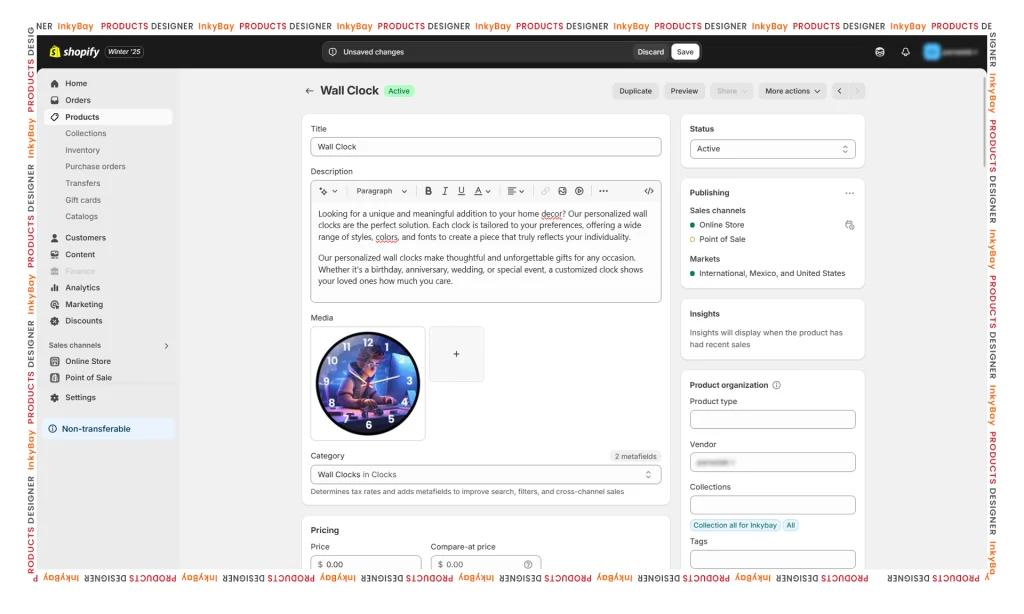
- Set Up Product Design in InkyBay:
- Go back to your Shopify dashboard and open the InkyBay app.
- Click on Products and find Wall Clock in the list.
- Click on Edit to set up the product’s design phases and options.
- Select Size: Add product sizes and set the price per size.
- Print Type and Quantity Discount: Choose your offered print type and quantity discount.
- Product Setup for Design Tools: Click on Advanced Settings. This is where you control the entire design backend.
Marketing Strategies to Grow Your Personalized Wall Clock Business
To drive traffic and sales for your personalized wall clock business, you need to implement effective marketing strategies. This section will cover various approaches to help you reach a broader audience and increase your sales.
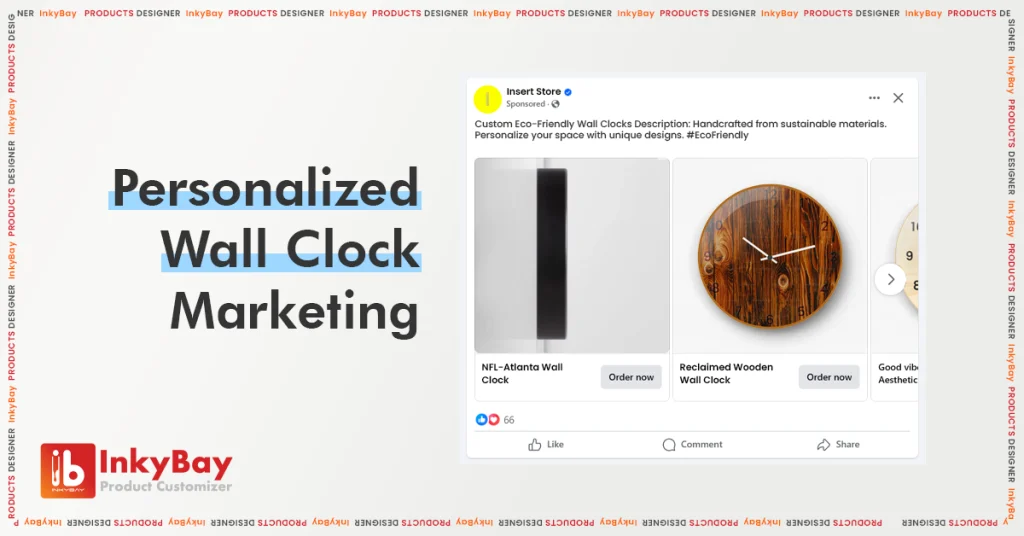
Social Media Advertising
Using social media platforms like facebook, Instagram and Pinterest is a powerful way to showcase your custom clock designs and attract potential customers. These platforms are highly visual and ideal for displaying the uniqueness of your personalized wall clocks.
Facebook Ads:
Facebook and its ad platform provide an excellent opportunity to reach a vast and highly targeted audience. By utilizing Meta Business Suite, you can seamlessly manage your personalized wall clock ads across both Facebook and Instagram, ensuring optimal control and visibility.
Instagram:
Create an Instagram business account and regularly post high-quality images of your wall clocks to grow your audience organically. Use features like Instagram Stories and Reels to share behind-the-scenes content, customer testimonials, and promotional offers. Utilize hashtags such as #customclocks and #personalizedgifts to increase your reach. Stay in a regular touch with your audience by responding to comments and messages promptly.
Pinterest:
Pinterest is another excellent platform for promoting custom products. Create visually appealing pins for your wall clocks and organize them into themed boards, such as “Eco-Friendly Home Decor” and “Unique Wall Clocks.” Include keywords in your pin descriptions to improve searchability. Encourage users to save and share your pins to drive traffic to your Shopify store.
SEO for Personalized Products
Optimizing your product pages for search engines is crucial for driving organic traffic to your store. Here are some tips for optimizing your product pages for “personalized wall clock” and related terms:
Keyword Research:
Identify relevant keywords that potential customers might use to search for personalized wall clocks. Tools like Google Keyword Planner and Ahrefs can help you find popular search terms.
On-Page SEO:
Incorporate these keywords naturally into your product titles, descriptions, and meta tags. For example, use phrases like “handcrafted personalized wall clock,” “custom engraved clock,” and “eco-friendly wall clock” in your content. Ensure that your product descriptions are informative, engaging, match a long list of search intent and include all relevant details about the customization options available.
Image Optimization:
Use high-quality images with descriptive file names and alt text that includes your target keywords. This helps search engines understand the content of your images and improves your chances of appearing in image search results.
Content Marketing:
Create a blog on your Shopify store and publish articles related to personalized wall clocks, such as design tips, DIY customization ideas, and customer stories. This not only attracts visitors to your site but also establishes your brand as an authority in the niche.
Email Marketing Campaigns
Email marketing is a powerful tool for retaining customers and promoting new designs. Build and maintain an email list to keep your audience engaged and informed.
Welcome Series:
Send a series of welcome emails to new subscribers, introducing your brand and showcasing your best-selling products. Offer a discount code or special offer to encourage first-time purchases.
Product Updates:
Regularly update your email subscribers about new designs, customization options, and special promotions. Use visually appealing templates and personalize your emails to make them more engaging.
Customer Retention:
Send follow-up emails to customers after their purchase, thanking them for their order and asking for feedback. Offer exclusive discounts for repeat purchases and encourage them to share their experience on social media.
Collaborations and Partnerships
Partnering with influencers or home décor bloggers can help you reach a wider audience and build credibility for your brand.
Influencer Marketing:
Identify influencers in the home décor or eco-friendly niche who align with your brand values. Reach out to them with a proposal for collaboration, such as reviewing your personalized wall clocks or hosting a giveaway. Influencers can create authentic content that resonates with their followers and drives traffic to your store.
Blogger Collaborations:
Partner with popular home décor bloggers to feature your products in their blog posts. Provide them with sample products and ask them to write detailed reviews or create styled photoshoots showcasing your wall clocks. This can generate valuable backlinks to your site and improve your SEO.
Read Our Latest Blogs-
FAQs
How much does it cost to set up a Shopify store?
Setting up a Shopify store can vary in cost depending on the plan you choose. The Basic Shopify plan starts at $19 per month, which includes essential features for setting up your online store. Additional costs may include purchasing a theme, installing apps, and any custom development work you might require.
What customization features can I offer with a personalization app?
Using a personalization app like InkyBay on Shopify, you can offer a wide range of customization features, including adding text, uploading images, choosing from various design templates, and selecting different materials and finishes for your wall clocks. These features enhance the customer experience by allowing them to create unique, personalized products tailored to their preferences.
How do I handle shipping and returns for custom products?
For shipping, you can set up different options such as flat-rate shipping, free shipping for orders over a certain amount, or real-time carrier rates. Shopify integrates with various shipping carriers to streamline the process. For returns, it’s important to have a clear policy in place. Since personalized products are custom-made, consider offering returns only for defective items or errors in customization. Make sure to communicate this policy clearly on your website.
Can I offer bulk orders or corporate gifting options?
Yes, offering bulk orders and corporate gifting options can be a great way to expand your business. You can create special packages and discounts for large orders and provide customization services tailored to corporate clients’ branding needs. Promote these options on your website and reach out to businesses and organizations to market your services.
What payment methods does Shopify support?
Shopify supports a wide range of payment methods, including major credit cards, PayPal, Apple Pay, Google Pay, and more. You can also integrate other payment gateways if needed. Shopify Payments, the platform’s built-in payment processor, simplifies the process and offers competitive transaction fees.
How can I track the performance of my Shopify store?
Shopify provides built-in analytics tools that allow you to track key performance metrics such as sales, traffic, conversion rates, and customer behavior. You can also integrate third-party analytics tools like Google Analytics for more in-depth insights. Regularly reviewing these metrics helps you make data-driven decisions to optimize your store and marketing strategies.
What marketing tools are available on Shopify?
Shopify offers a variety of built-in marketing tools, including email marketing, SEO optimization, social media integration, and discount code generation. Additionally, you can access numerous marketing apps in the Shopify App Store to further enhance your promotional efforts.
How do I handle customer service for my Shopify store?
Providing excellent customer service is crucial for building trust and loyalty. Shopify allows you to manage customer inquiries through email, chat, and social media. You can also use customer service apps to streamline the process and provide timely responses. Creating a comprehensive FAQ section, like this one, can help address common questions and reduce the volume of inquiries.


